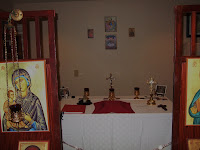
- God is Mystery (check)
- God is "everywhere present and fills all things" (check)
- God loves and is a befriending God (check)
- God came in the flesh to save us from death (check)
- Jesus, who is God Incarnate, died and then came back to life (check)
- We are never, at any time, without hope (check)
But a funny thing happened on the way to the altar. The first few years, I was more a skeptic-with-hope; now I seem not to need the skepticism anymore. And this is a strange realization -- that skepticism was as much a need for me as faith was. Skepticism was my safety-net, just in case I ended up being a fool. If, at the end of all things, my beliefs about Jesus turned out to be a fantasy, I wanted to be able to say, "Yeah, but I wasn't absolutely sure. I wasn't operating on blind faith. I STILL HAVE A BRAIN, ya know."
Of course, I wasn't sure who it was I'd be saying this to, because if the atheists are right, I won't exist anymore, anyway.
Am I simply more psychologically invested in my faith? Yes, definitely. But it's more than that. It's a kind of caution-to-the-wind thing -- a lack of concern over whether others find me foolish. And what happens now is that I encounter God more frequently, now that I don't hold back. There's a freedom in this -- in being able to light the candles in the chapel and not second-guess myself in the middle of the night, but to simply know that Christ is present with me. It is, I think, something like the stages of falling in love. At first, we are unsure of the beloved -- we don't know whether we can trust him, even though we are attracted and he seems attracted back. But after some time goes by, the relationship develops a surety. I've noticed this in 26 years of marriage. And I notice it in my faith.
So I find I am at a new phase now. One that fills me with wonder.

2 comments:
I saw your blog address at the bottom of your email and took a peek. I was impressed with this post and thought I'd comment. I understand what you mean by your skepticism being part of your experience. I have dealt with this too. Where many cling to their skepticism to excuse their brain from thinking or changing themselves to a better person, to what God wants, those of us who are skeptics because we need to use our brains to become a better person understand the dilemma of faith versus knowledge. But I really think therein lies the greatest growth possibilities. When we trust that there is someone who knows more than us, and wants us to learn it with Him but knows that we have to let go of our own finite understanding of things to be able to grasp the infinite understanding. It's such a dichotomy but a truly amazing process of learning. As most discoveries are, it's not what made sense at first, but when you look back...its astonishing in its simplicity. Anyhow I just wanted to drop my two cents. Once again, I loved the blog.
Thanks, Karen! It's good to find a kindred spirit.
Yes, it's that walking into the infinite that I love most.
Post a Comment